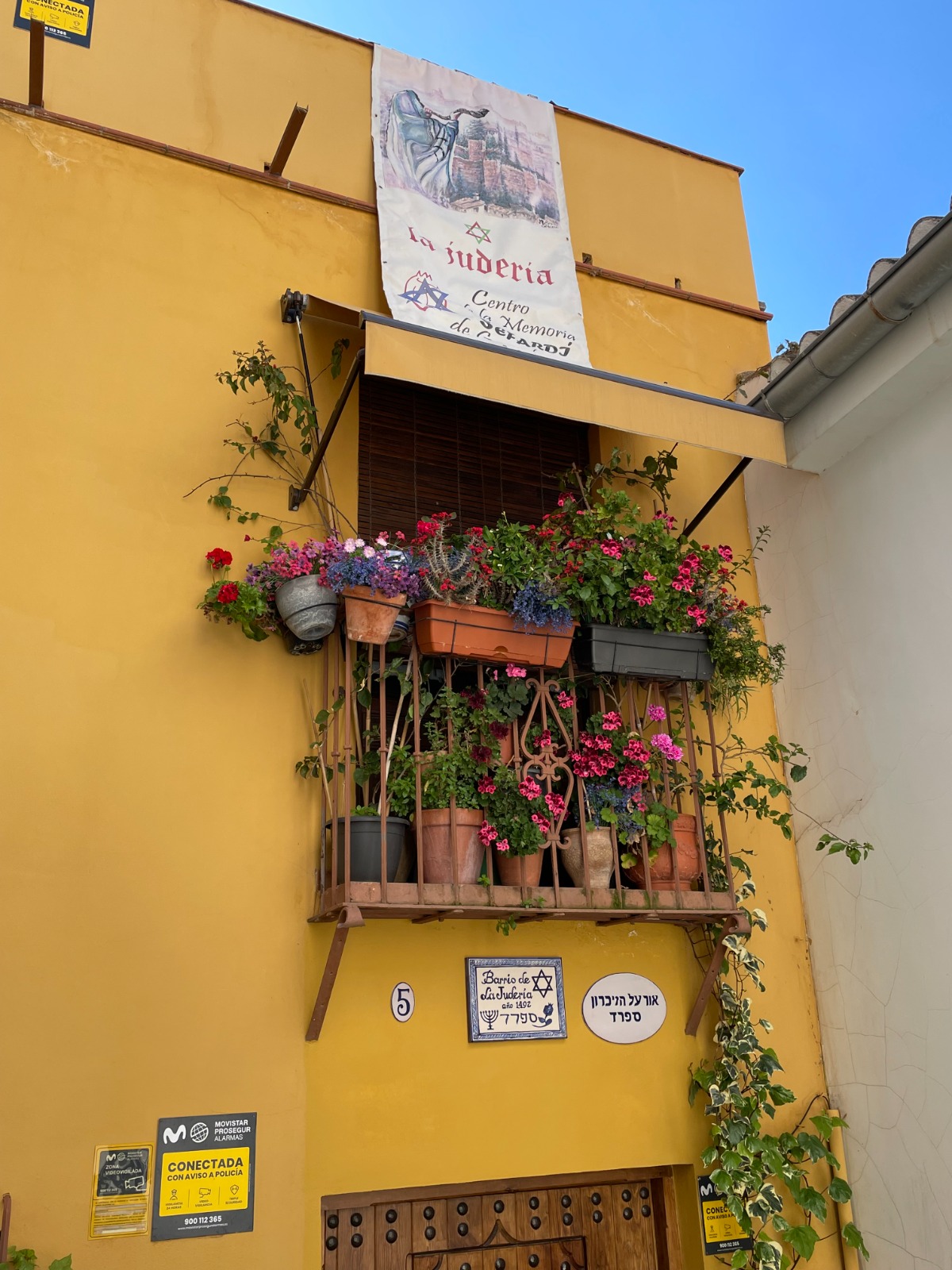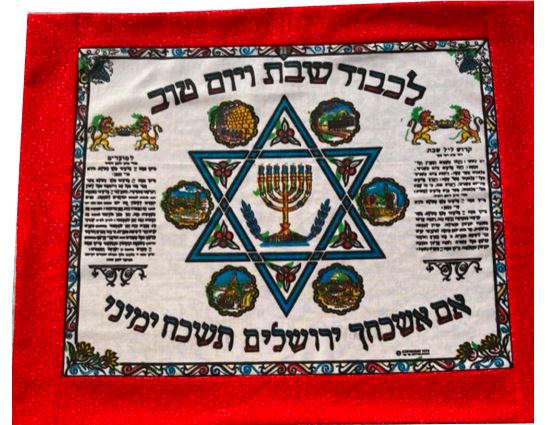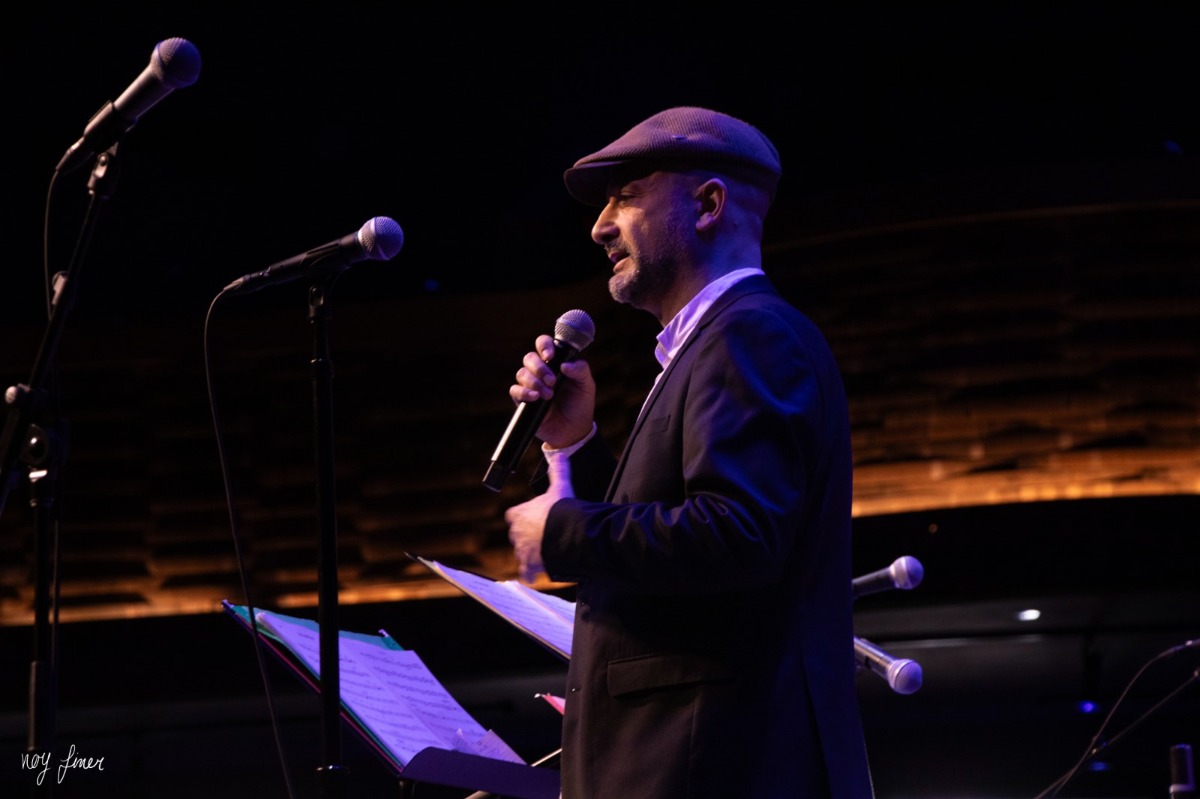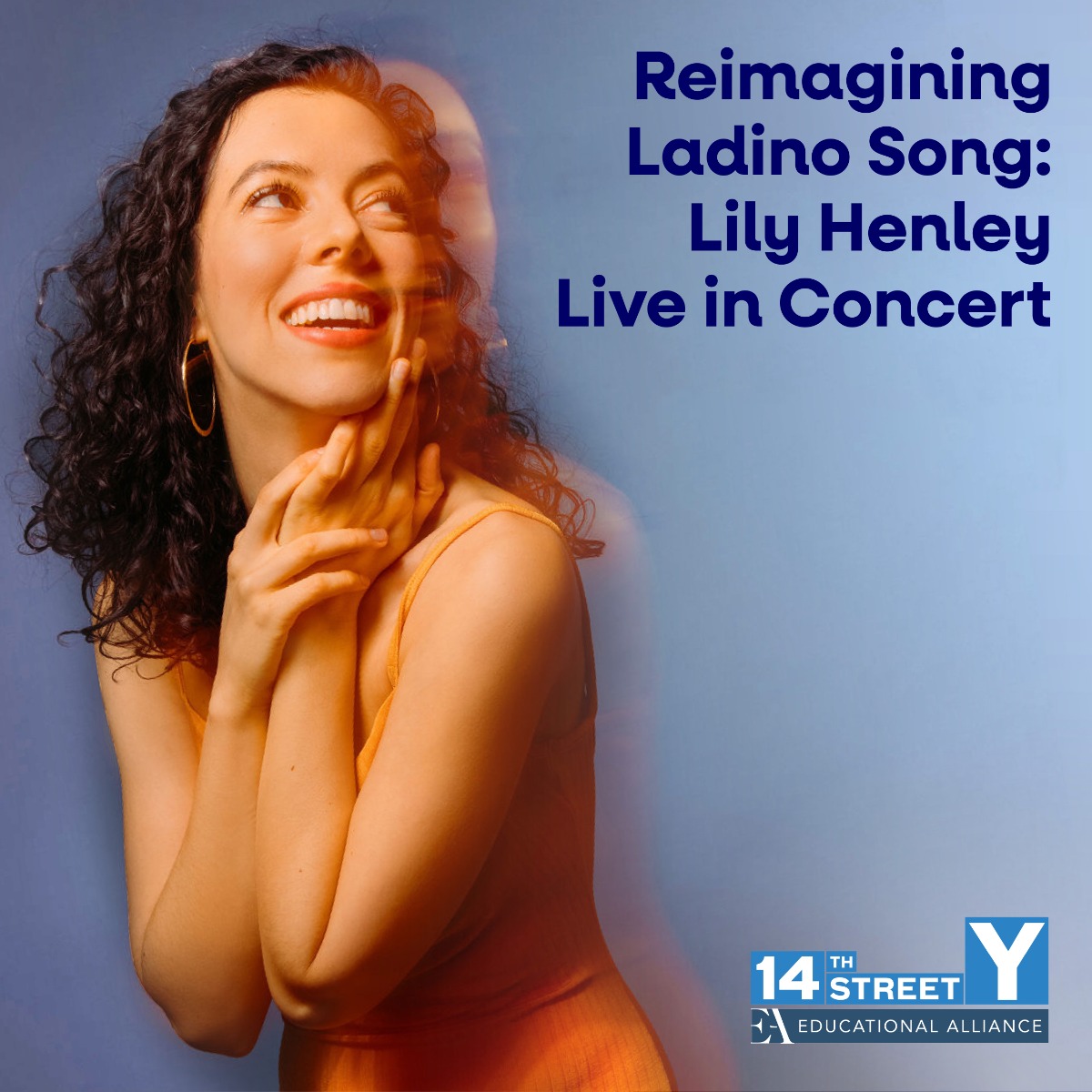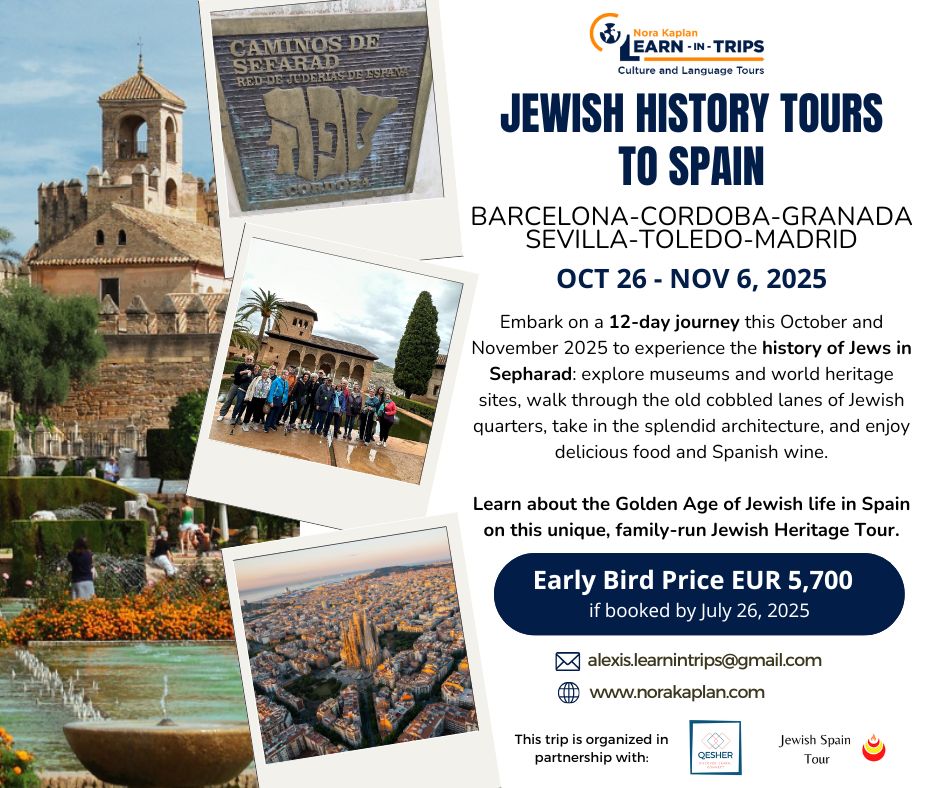Hazaq u’Barukh to Avi Garson (The Habura) and Ethan Marcus (Sephardic Brotherhood of America), co-organizers of the landmark Sephardic Rabbinic Conference, which featured 50 Hakhamim from around the world, at the Orthodox Union and TriBeCa Synagogue
Click here to dedicate a future issue in honor or memory of a loved one
Subscribe ◊ Upcoming Events ◊ ASF Sephardi Shop ◊ Donate ◊ Sephardi Ideas Monthly ◊ ASF IJE ◊ ASF Sephardi House ◊ Archive
The Sephardi World Weekly is made possible by Daniel Yifrach, Rachel Sally, Professor Rifka Cook, Maria Gabriela Borrego Medina, Rachel Amar, Deborah Arellano, & ASF VP Gwen Zuares!
Don’t miss the latest Sephardi Ideas Monthly: “Deep Listening: Exploring Music with Dan Asia”
“A Sephardic Diaspora in Sepharad: Exile and Longing in the Poetry of Moses Ibn Ezra”
By Matthew D. Warshawsky, Sephardic Horizons
“Centro de la Memoria Sefardi, a house in the former
Jewish quarter of Granada,” Spain.
(Photo courtesy of Theresa Burks/Sephardic Horizons)
Writing in the Summer, 2025 issue of Sephardic Horizons, University of Portland Prof. Matthew D. Warshawsky explores songs of exile and longing in the work ofMoses Ibn Ezra(1055-1138), one of the great Jewish poets of al-Andalus. Warshawsky especially focuses on the displacements within Spain that shaped Ibn Ezra’s writing.
Born into a prominent family in Granada but uprooted following the Almoravid conquest in 1090, Ibn Ezra’s poetry reflects nostalgia for Granada and the pain of his displacement, often portraying himself as a “wanderer” separated from family and community.
Warshawsky highlights how Ibn Ezra often embeds his exile within traditional precedents. Recalling the end of his childhood in Granada, “After the days of my youth became / like a shadow … flight shouted to me, ‘Arise, carefree one!’” the poet likens his tears to “the waters of Noah” and recalls Job’s cry: “Those I love have turned against me … I escape with the skin of my teeth.” Warshawsky notes how, drawing on these charged parallels, Ibn Ezra situates his own exile in a continuum of Jewish suffering and resilience.
The poet also reflects upon estrangement from family and community. In one poem, Ibn Ezra laments that “the sons of my mother hardened their heart,” while even his children “insulted” him. He further complains of living “in a desert of wild asses … violent men in need of a little knowledge,” underscoring his alienation in Christian Spain.
Ultimately, Ibn Ezra consoles himself in his loneliness by reaffirming the strength of his poetic vision: “My verses will endure as long as the sun revolves … but they [others] will be forgotten completely.”
~~~~~~~
FEATURE: The Divan of Moses Ibn Ezra, Op. 207: A 20th c. Sephardi-Italian Composer Reimagines a 11th c. Sephardi poet
Album cover: Mario Castelnuovo-Tedesco’s The Divan of Moses-Ibn-Ezra: Song Cycle of Voice and Guitar, Opus 207 Roberta Alexander, Soprano and Dick Hoogeveen, Guitar
(Photo courtesy of Youtube)
The Divan of Moses-Ibn-Ezra, Op. 207, is a 1966 song cycle composed by Mario Castelnuovo-Tedesco. Set for voice and guitar, a rare format in twentieth-century chamber music, the work consists of several movements based on poems by the legendary Spanish-Jewish poet Moses Ibn Ezra (c. 1055–1135).
Born in Florence to a Jewish family of Sephardic descent, Castelnuovo-Tedesco’s heritage and love of Jewish literature influenced his music from early on. The Divan of Moses Ibn Ezra explores transience, love, and grief, and in this recording of “The Garden Dons a Coat of Many Hues” from the song cycle, Ibn Ezra’s celebration of the vivid transformation of a garden in spring is enlivened by the American soprano Roberta Alexander, renowned for her expressive artistry and luminous tone.
~~~~~~~
~~~~~~~
Upcoming Events or Opportunities
Announcing a new Online Course
Soundtrack of a Nation: An Introduction to Israeli Music
Explore and enjoy Israeli music as a way to understand Israel as it is—beyond the headlines. Guided by Dr. Aryeh Tepper, a dynamic instructor with deep knowledge of Israeli culture and extensive experience teaching in Israel and the United States, this course invites you to discover the fascinating stories and vibrant pluralism of Israeli society through the diversity of its music, while avoiding the polemics that often bedevil conversations about Israel in academia and the media. No prior experience is needed—just a sense of curiosity, an open mind and a receptive soul, and you'll come away with a playlist to last a lifetime.
Sign-up Now!
Twelve Sessions Starting on 11 September
~~~~~~~
Our friends at 14Y, Be’chol Lashon, and the Center for Traditional Music and Dance present:
Reimagining Ladino Song: Lily Henley Live in Concert
“Join groundbreaking singer-composer Lily Henley and multi-instrumentalist Duncan Wickel as they reimagine Ladino music, blending its lyrics with the rich textures of Celtic and Americana folk. Once spoken across the Mediterranean by Jewish communities, Ladino is now a language spoken by fewer than 100,000 people. A blend of Old Spanish, Hebrew, Turkish and Arabic, Ladino carries centuries of Sephardic history, storytelling, and cultural tradition. Lily isn’t just preserving this 500-year-old tradition—she’s reinventing its music for today.
In Henley’s one-hour concert, she and Wickel will perform brand-new songs from her upcoming album, alongside selections from their acclaimed release Oras Dezaoradas (Lior Editions Paris, 2022). After the concert, Henley and Ladino expert Bryan Kirschen will engage in an insightful conversation about the cultural history, resilience, and ongoing revival of the Ladino musical tradition.”
Thursday, 18 September, at 7:00 PM
Sign-up Now!
@14Y - 344 E 14th St, NYC
Tickets: $16.99 - $19.99 including fees
This program is presented by 14Y, Be’chol Lashon and the Center for Traditional Music and Dance, and cosponsored by the American Ladino League, American Sephardi Federation, Hebrew Union College Jewish Language Project, Jalopy Theater and School of Music, and Kanisse. This event is also sponsored by a Humanities New York Action Grant.
~~~~~~~
Our friends at Qesher in partnership with Nora Kaplan Learn-in-trips presents:
Jewish History Tours to Spain
BARCELONA-CORDOBA-GRANADA
SEVILLA-TOLEDO-MADRID
Embark on a 12-day journey this October and November 2025 to experience the history of Jews in Sepharad: explore museums and world heritage sites, walk through the old cobbled lanes of Jewish quarters, take in the splendid architecture, and enjoy delicious food and Spanish wine.
Learn about the Golden Age of Jewish life in Spain on this unique, family-run Jewish Heritage Tour.
26 October - 6 November, 2025
For questions or more information, please visit www.norakaplan.com or email alexis.learnintrips@gmail.com.
Note: While this is not an ASF program, the American Sephardi Federation is proud to serve as a promotional partner for this unique educational experience.

